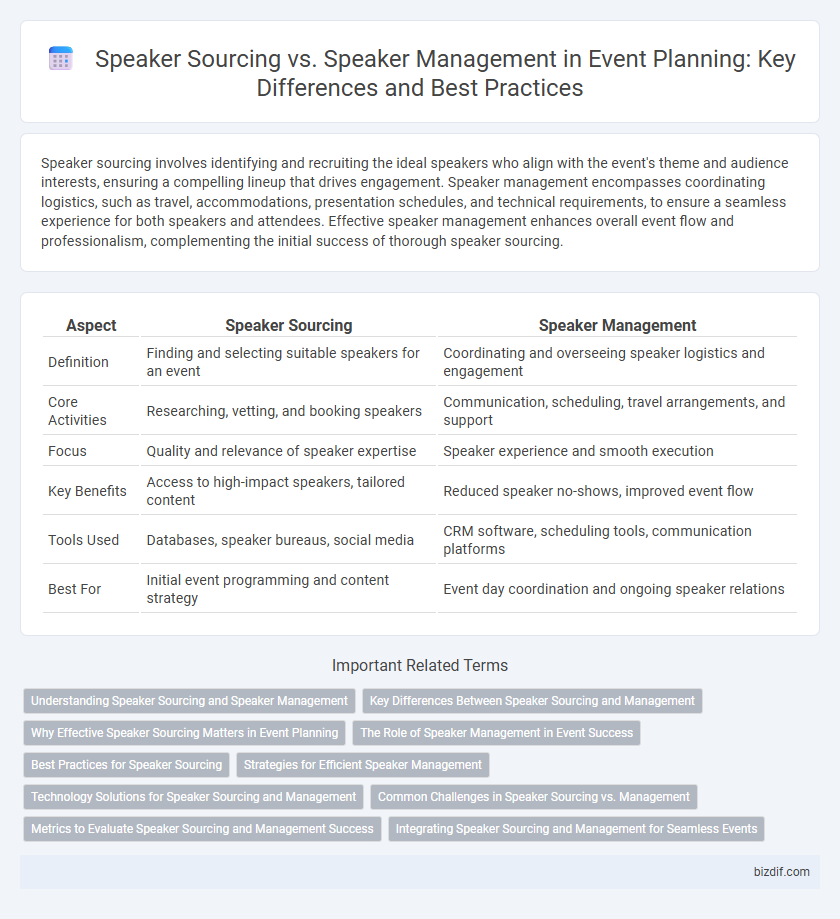Speaker sourcing involves identifying and recruiting the ideal speakers who align with the event's theme and audience interests, ensuring a compelling lineup that drives engagement. Speaker management encompasses coordinating logistics, such as travel, accommodations, presentation schedules, and technical requirements, to ensure a seamless experience for both speakers and attendees. Effective speaker management enhances overall event flow and professionalism, complementing the initial success of thorough speaker sourcing.
Table of Comparison
| Aspect | Speaker Sourcing | Speaker Management |
|---|---|---|
| Definition | Finding and selecting suitable speakers for an event | Coordinating and overseeing speaker logistics and engagement |
| Core Activities | Researching, vetting, and booking speakers | Communication, scheduling, travel arrangements, and support |
| Focus | Quality and relevance of speaker expertise | Speaker experience and smooth execution |
| Key Benefits | Access to high-impact speakers, tailored content | Reduced speaker no-shows, improved event flow |
| Tools Used | Databases, speaker bureaus, social media | CRM software, scheduling tools, communication platforms |
| Best For | Initial event programming and content strategy | Event day coordination and ongoing speaker relations |
Understanding Speaker Sourcing and Speaker Management
Speaker sourcing involves identifying and booking qualified speakers who align with the event's goals, ensuring a diverse and engaging lineup. Speaker management focuses on coordinating logistics, communication, and support for speakers before, during, and after the event to guarantee seamless presentations. Effective event planning requires balancing both sourcing and management to maximize speaker impact and attendee satisfaction.
Key Differences Between Speaker Sourcing and Management
Speaker sourcing involves the identification and recruitment of qualified individuals who align with an event's theme and audience, emphasizing market research, outreach, and contract negotiation. Speaker management focuses on coordinating logistics, preparation, and communication to ensure speakers deliver effectively and meet event goals. Key differences include sourcing prioritizing talent discovery and contracting, while management centers on operational support and performance facilitation.
Why Effective Speaker Sourcing Matters in Event Planning
Effective speaker sourcing is crucial in event planning because securing high-quality, relevant speakers directly impacts audience engagement and event success. Identifying speakers who align with the event's theme and attendee interests ensures meaningful content and enhances credibility. Poor sourcing can lead to disengaged participants and diminished event reputation, making a strategic approach essential for maximizing impact.
The Role of Speaker Management in Event Success
Effective speaker management ensures seamless communication, timely coordination, and personalized support for speakers, directly enhancing the overall event experience. Unlike speaker sourcing, which focuses on identifying and recruiting talent, speaker management oversees logistics, rehearsals, and engagement to maintain speaker readiness and confidence. This comprehensive approach plays a critical role in delivering impactful presentations and achieving event success.
Best Practices for Speaker Sourcing
Effective speaker sourcing for event planning involves targeted research to identify industry experts whose expertise aligns with the event theme and audience interests. Utilizing professional networks, social media platforms like LinkedIn, and specialized speaker bureaus enhances the discovery of reputable and engaging speakers. Prioritizing clear communication of event goals, speaker expectations, and logistical details ensures a smooth selection process and builds strong partnerships.
Strategies for Efficient Speaker Management
Effective speaker management strategies involve a structured approach to sourcing, vetting, and coordinating speakers to ensure alignment with event goals and audience interests. Leveraging technology platforms for streamlined communication and scheduling enhances speaker engagement and reduces logistical challenges. Continuous feedback mechanisms and clear contractual agreements contribute to a smooth management process, maximizing event impact and speaker satisfaction.
Technology Solutions for Speaker Sourcing and Management
Technology solutions for speaker sourcing and management streamline the event planning process by automating talent discovery, talent vetting, and contract negotiations through AI-driven platforms. Speaker sourcing tools leverage extensive databases and machine learning algorithms to match speakers' expertise with event themes, while speaker management systems centralize communication, scheduling, and content delivery to enhance coordination and attendee engagement. Integrated platforms that combine sourcing and management features optimize efficiency, reduce administrative overhead, and improve speaker experience through real-time analytics and automated workflow management.
Common Challenges in Speaker Sourcing vs. Management
Speaker sourcing often struggles with identifying qualified experts, verifying availability, and negotiating fees, leading to delays in event timelines. Speaker management faces challenges such as coordinating schedules, handling last-minute changes, and ensuring adherence to contractual obligations. Both phases require meticulous communication and contingency planning to maintain event quality and attendee engagement.
Metrics to Evaluate Speaker Sourcing and Management Success
Effective speaker sourcing is measured by metrics such as the diversity of expertise, relevance to the event theme, and lead time to secure high-quality speakers. Speaker management success hinges on audience engagement rates, speaker satisfaction scores, and adherence to scheduled timelines. Tracking these metrics ensures optimized event impact and seamless speaker coordination.
Integrating Speaker Sourcing and Management for Seamless Events
Integrating speaker sourcing and speaker management streamlines the entire event planning process by ensuring a cohesive approach to identifying, vetting, and coordinating speakers. Centralized platforms allow event planners to efficiently match speaker expertise with event themes while handling contracts, schedules, and communication in one place. This integration reduces logistical challenges, enhances speaker experience, and guarantees consistent quality across all event sessions.
Speaker sourcing vs Speaker management Infographic

 bizdif.com
bizdif.com